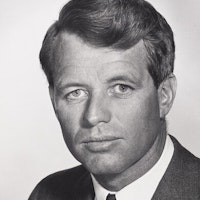What we need in the United States is not division; what we need in the United States is not hatred; what we need in the United States is not violence or lawlessness; but love and wisdom, and compassion toward one another…
Robert F. Kennedy

What We Need
Topic: Justice, Vision, & Leadership
What we need in the United States is not division; what we need in the United States is not hatred; what we need in the United States is not violence or lawlessness; but love and wisdom, and compassion toward one another, and a feeling of justice toward those who still suffer within our country, whether they be white or they be black.
Robert F. Kennedy (1925-1968)
Robert F. Kennedy was a U.S. attorney general, U.S. senator from New York, and presidential candidate. He was a champion of civil rights and social justice. He was assassinated while campaigning for president in 1968.
Kennedy was born into a wealthy and powerful family, but he used his position to help others. He was a fearless advocate for the poor and the disadvantaged. He was also a strong advocate for peace and diplomacy.
After graduating from Harvard University and the University of Virginia School of Law, Kennedy served in the U.S. Navy during World War II. After the war, he worked as a lawyer and then as a campaign manager for his brother, John F. Kennedy, who was elected president in 1960.
Kennedy's Career in Public Service
As attorney general, Kennedy fought for civil rights and social justice. He also prosecuted organized crime. He was a key figure in the passage of the Civil Rights Act of 1964 and the Voting Rights Act of 1965.
Kennedy was also a strong advocate for peace and diplomacy. He played a key role in the Cuban Missile Crisis, helping to avert a nuclear war. He also worked to improve relations with the Soviet Union.
In 1964, Kennedy resigned as attorney general to run for U.S. Senate from New York. He won the election and served in the Senate from 1965 until his assassination in 1968.
Kennedy's Legacy
In 1968, Kennedy ran for president. He was assassinated while campaigning in California. His assassination was a tragedy for the United States and the world.
Kennedy was a complex and fascinating figure. He was a man of great privilege who used his position to help others. He was a champion of the poor and the disadvantaged, and he fought for civil rights and social justice. He was also a strong advocate for peace and diplomacy. Kennedy's legacy continues to inspire people around the world.
The Gospel According to RFK: Why it Matters Now
Kennedy, Robert F. "The Gospel According to RFK: Why it Matters Now." Basic Books, 2004. [Robert F. Kennedy's "Statement on the Assassination of Martin Luther King, Jr." given on April 4, 1968 in Indianapolis, Indiana.]

Robert F. Kennedy
Theme: A Vision of America

About This Robert F. Kennedy Quotation [Commentary, Part 1]
In his profound reflection, Robert F. Kennedy highlights a fundamental truth that resonates deeply within the fabric of the United States, and indeed, human society at large. His call is for a shift from division, hatred, and violence to a more compassionate, wise, and just society. Kennedy’s emphasis on love, wisdom, and compassion as pivotal to national healing and progress speaks to the heart of societal transformation. His words serve as a reminder that the path to a harmonious and equitable society lies not in exacerbating our differences, but in embracing a collective spirit of understanding and empathy. It is a call to recognize the suffering of others, regardless of their race, and to act with a sense of justice that transcends superficial divisions. This message, particularly in the context of the tumultuous times during which Kennedy spoke, highlights the enduring need for moral courage and the power of compassionate leadership in addressing societal ills.
The Passage from which this Quote by Robert F. Kennedy was Excerpted
“But we have to make an effort in the United States. We have to make an effort to understand, to get beyond, or go beyond these rather difficult times. My favorite poem, my — my favorite poet was Aeschylus. And he once wrote:
What we need in the United States is not division; what we need in the United States is not hatred; what we need in the United States is not violence and lawlessness, but is love, and wisdom, and compassion toward one another; and a feeling of justice toward those who still suffer within our country, whether they be white or whether they be black.
So I ask you tonight to return home, to say a prayer for the family of Martin Luther King — yeah, it’s true — but more importantly to say a prayer for our own country, which all of us love — a prayer for understanding and that compassion of which I spoke. We can do well in this country. We will have difficult times. We’ve had difficult times in the past, but we — and we will have difficult times in the future. It is not the end of violence; it is not the end of lawlessness; and it’s not the end of disorder.
But the vast majority of white people and the vast majority of black people in this country want to live together, want to improve the quality of our life, and want justice for all human beings that abide in our land. And let’s dedicate ourselves to what the Greeks wrote so many years ago: to tame the savageness of man and make gentle the life of this world. Let us dedicate ourselves to that, and say a prayer for our country and for our people.
[Click “Read More” Below]
About This Robert F. Kennedy Quotation [Commentary, Part 2]
Kennedy’s legacy, marked by his unwavering commitment to civil rights and social justice, exemplifies the essence of moral courage. His response to the assassination of Martin Luther King Jr., especially his reference to Aeschylus*, underscores the profound impact of wisdom born from suffering and the transformative power of ‘the awful grace of God.’ This wisdom, often forged in the crucible of great personal and collective pain, is essential in navigating the complex realities of social injustice. Kennedy’s life and words inspire a contemplation on the nature of courage, not just as a virtue in times of crisis, but as a continual commitment to stand for what is right, against all odds. His message is a clarion call to each individual to embody love, wisdom, and compassion in their daily lives. It is a reminder that the pursuit of justice and equality is an ongoing journey, one that requires both individual and collective moral fortitude.
*On the night of King’s assassination, Kennedy gave a speech in Indianapolis in which he quoted the Greek playwright Aeschylus: “Even in our sleep, pain which cannot forget falls drop by drop upon the heart, until, in our own despair, against our will, comes wisdom through the awful grace of God.”
Rabbi Jonathan Sacks [Commentary]
Additional Robert F. Kennedy Quotations
Resources
Related Quotes
Copyright © 2017 – 2026 LuminaryQuotes.com About Us